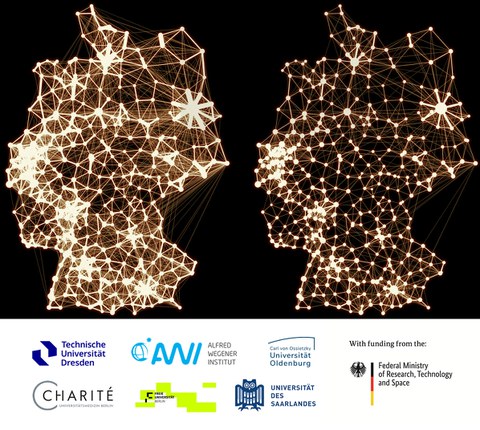Nov 28, 2025
Pandemic forecasting and detection moves up a gear: Federal government funds TUD research

Network visualization of Germany showing changes in mobility or contact structures during a pandemic, more centralized on the left, more evenly distributed on the right. (From: COVID-19 lockdown induces disease-mitigating structural changes in mobility networks, Proc. Natl. Acad. Sci. U.S.A. 117 (52) 32883-32890)
SynoSys aims to develop a model ecosystem for future epidemics as part of the DREAM EP project
How can we spot future pandemics earlier? Which data really helps to make precise forecasts? And how can human behavior be integrated into predictive models? The DREAM EP (Data-informed Responsive Epidemic Analysis and Multiscale-Modelling for Epidemic Preparedness) research project is cooperating closely with SynoSys (Synergy of Systems) and a consortium of leading researchers in order to answer these and other questions. The center at TU Dresden has been awarded funding from the Federal Ministry of Research, Technology and Space.
The project, which will receive a total of EUR 1.8M, supports cutting-edge research in the field of pandemic forecasting. SynoSys will receive EUR 150,000 in the first funding phase. A second installment of EUR 150,000 is planned in two years' time, if the project is keeping up with its objectives.
A model ecosystem for future epidemics
DREAM EP is striving to improve the predictability of severe respiratory diseases. For this purpose, the project team will collect data on human contact structures, mobility patterns and protective behavior. By analyzing high-resolution data sets from the COVID-19 pandemic, DREAM EP is creating a comprehensive model ecosystem that maps spatial and temporal scales using methods from network science, machine learning and artificial intelligence.
Interdisciplinary consortium headed by TU Dresden
Coordinated by Prof. Dirk Brockmann, director of the Center Synergy of Systems at TUD Dresden University of Technology, the project amalgamates an interdisciplinary consortium. The partners involved include Prof. Thilo Gross (Alfred Wegener Institute), Prof. Bernd Blasius (Carl von Ossietzky University of Oldenburg), Prof. Christian Drosten (Charité Berlin), Prof. Vitaly Belik (Freie Universität Berlin) and Prof. Thorsten Lehr (Saarland University). By combining their expertise, they cover the key subject areas of epidemiology, virology, statistical physics, public health and computer-aided modeling. This interdisciplinary collaboration makes it possible to better understand the interactions between the way pandemics develop and the human response.
From large data sets to flexible prediction models
Based on extensive data sets – not only data on the evolution of the SARS-CoV-2 virus, but also daily mobility data from Germany and global air traffic flows – DREAM EP will develop an adaptive modeling framework. In addition to investigating fundamental questions about scales and feedback in epidemiological modeling, the project also aims to develop more accurate, data-supported forecasting tools.
These include:
- Analysis of changing mobility networks during pandemics and their influence on disease dynamics
- Analysis of contact networks on a micro scale and clinical procedures
- Causal analysis between the spread of disease, behavior, information and policy
- Development of optimal models for epidemic forecasts
- Identification of viral evolution principles in network-structured populations
- Development of a scalable framework for the prediction of severe respiratory diseases
Bolstering the ability to deal with a pandemic
Using methods such as machine learning, deep learning, network and causal analysis, and hypergraph modeling, a future-oriented platform will be created that should significantly improve the predictive power in the early phases of an outbreak. DREAM EP is therefore making a decisive, scientifically sound contribution to long-term strategies for global health protection and pandemic resilience.
Contact:
Center Synergy of Systems
Prof. Dirk Brockmann
Tel.: +49 351 463 40918
E-Mail:
